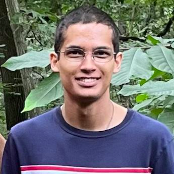CLT10 National Award Winner Spotlight:
James Krishnan Myjak

In preparation for the release of this year’s CLT10 awards, CLT is celebrating some of our past National Award Winners!
We reached out to a handful of scholarship winners from 2020, and asked them to share about their testing experience at CLT, their time at their CLT partner college of choice, and their college preparation advice for current high school students. This post celebrates James Krishnan Myjak. Now a rising sophomore at Benedictine College, his answers discuss the importance of detail and concentration in college work, and the benefit of truly internalizing knowledge instead of just memorizing it. Congratulations, James, and thank you for your helpful answers!
✵ ✵ ✵
CLT: Thanks for talking with us. To start with, how did the exam prepare you for college?
JKM: Regarding preparation for college, I think that the practice from preparing for and taking the reading section of the test, as well as other standardized tests, was helpful for developing a technique to read through and note important parts in assigned reading material. Parts of the math section seemed useful for practicing solving situations involving different parts of triangles more smoothly, which was useful in multiple different college classes.
CLT: Would you say your CLT10 Scholarship has benefited you as a student?
JKM: Winning the award scholarship from the CLT10 was an encouragement to me, because the test was tricky in different ways than I was used to (particularly in the math section, which was my best section on other standardized tests). Also, of course, any scholarship is always a good thing, which I am grateful for.
CLT: We’re glad to help! Switching over to your college studies, would you pinpoint any one class you took this year as having had the biggest impact on you?
JKM: I would probably choose my college’s Classical Physics I & II (both including labs) for having the largest impact on me overall. In the physics lecture sections, I had a teacher whose methods and style were well-chosen and effective. His teaching covered the physics sections in a systematic and memorable way, with frequent humorous examples which both helped illustrate the necessary concepts and made them more memorable. In that class, both through his teaching and my own efforts, I gained an understanding of different types of problems and ideas and how they fit together better than before.
CLT: What’s one thing you wish you had known before starting your freshman year?
JKM: I’m not sure if this is really something that would have been practical, but I really wish I had had a better idea of what expectations the professors would have for the degree of depth and detail in work—especially in more technical or scientific writing, like lab reports.
CLT: Sounds pretty practical to me!
This varies among people a lot, but I also wish I had known a good approach to planning and prioritizing my different tasks, so that I could get them done more effectively and more in advance of when they were due, instead of having to sacrifice sleep to finish them right before.
CLT: To wrap things up: aside from being Superman and not needing to sleep, is there any advice you’d like give to other CLT10 test-takers who are currently planning for college?
JKM: I have found out from experience that, if one wants to actually internalize and utilize the topics he’s learning—in physics, chemistry, math, and even philosophy—it’s very important to try to make the extra effort to actually understand and tie together topics, concepts, and ideas in the mind. Many people, even some fairly high-achieving ones, seem to try to use formulas, memorized facts, and other superficial learning rather than really understanding everything. They can often get decent grades this way, but this really makes work more difficult and leads to a lack of long-term understanding. Consequently, when the exact same techniques and concepts appear later, the students who failed to internalize them earlier complain because they don’t remember how to use or apply them.
What shall we do on the Last Day, when the works of humankind are weighed, with three treatises on formic acid? On the other hand, what do we know about the Last Day, if we don't even know what can be done with formic acid between now and then?
Robert Musil, The Man Without Qualities
__________________________________________________________________________________
Thank you for reading the Journal! If you’d like to see more from CLT’s top students, you can find further interviews, essays, and pieces of creative writing right here. We’re also in the midst of our final topic in our brief introductions the Great Conversation—two posts are up in our concluding miniseries on wisdom (with a third going up tomorrow!). Or, if you prefer your great conversations live, tune in to our podcast, Anchored, hosted by CLT’s founder, Jeremy Tate.
Published on 20th September, 2023. Other information.